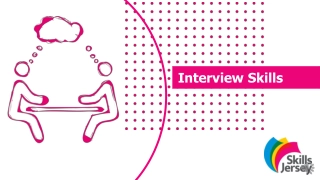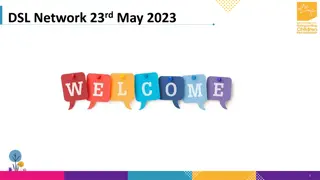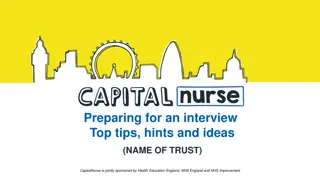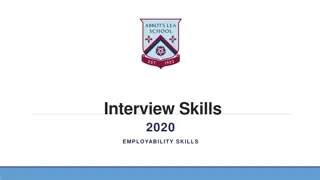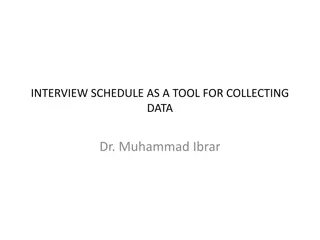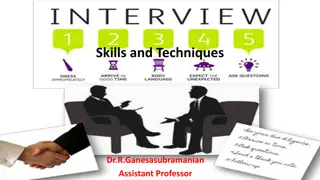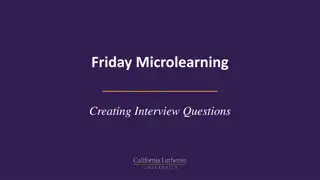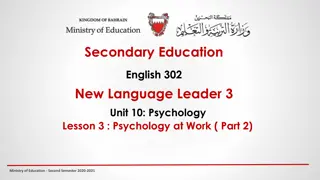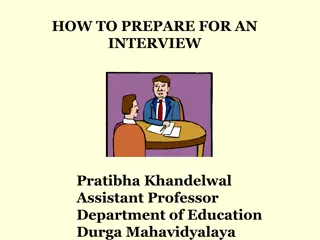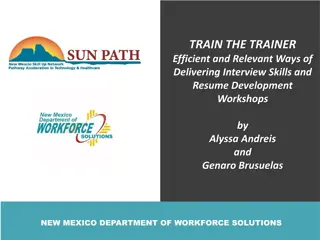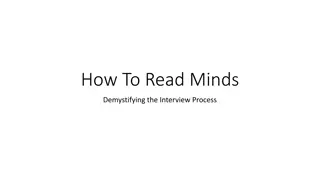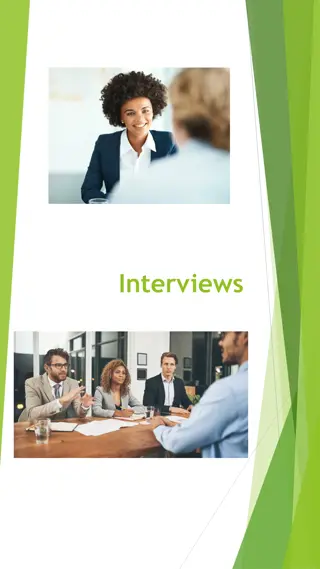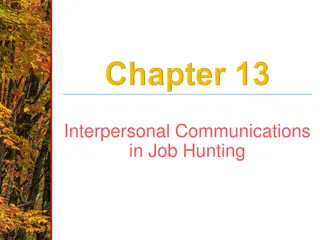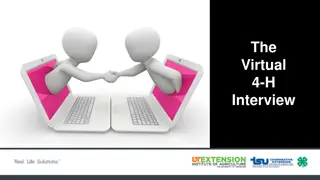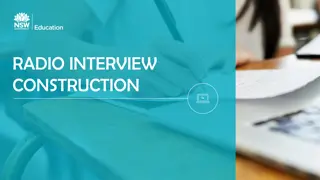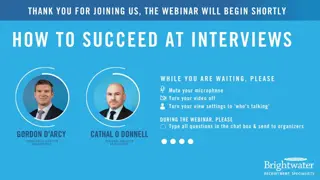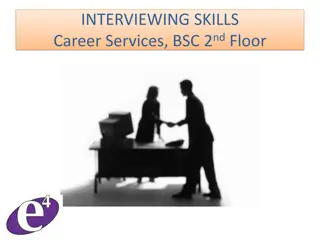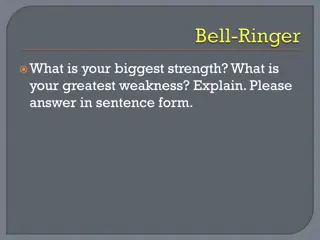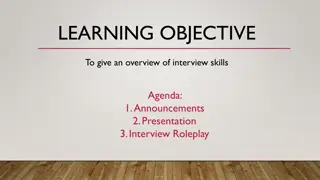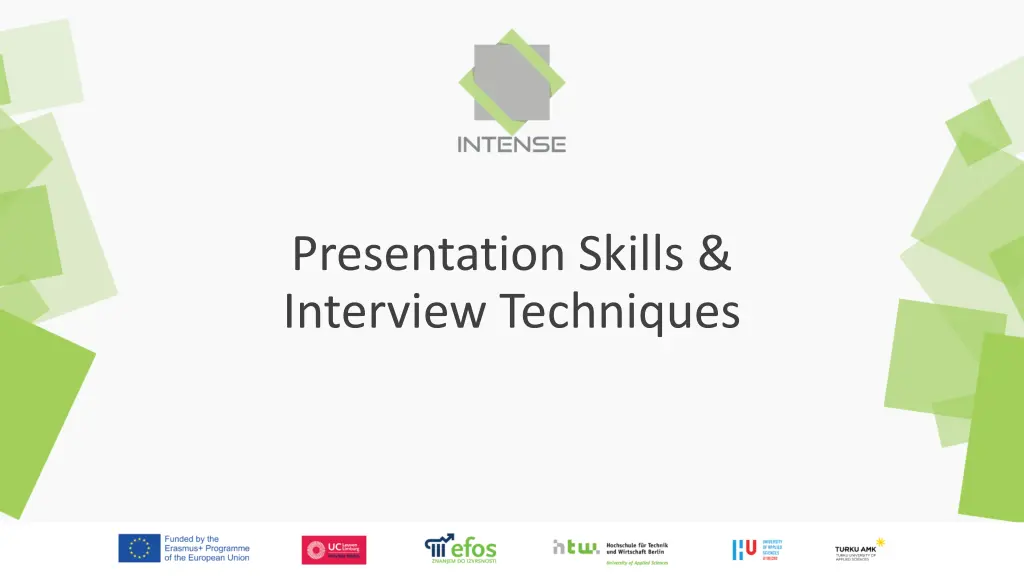
Mastering Interviewing Techniques and Skills
Enhance your interview techniques, research skills, and presentation skills with this comprehensive guide. Learn about different types of primary data collection, interview methodologies, and the importance of effective interviewing for consultants.
Download Presentation

Please find below an Image/Link to download the presentation.
The content on the website is provided AS IS for your information and personal use only. It may not be sold, licensed, or shared on other websites without obtaining consent from the author. If you encounter any issues during the download, it is possible that the publisher has removed the file from their server.
You are allowed to download the files provided on this website for personal or commercial use, subject to the condition that they are used lawfully. All files are the property of their respective owners.
The content on the website is provided AS IS for your information and personal use only. It may not be sold, licensed, or shared on other websites without obtaining consent from the author.
E N D
Presentation Transcript
Presentation Skills & Interview Techniques
Learning Objectives 1. Students enhance their interview techniques by developing an interview outline and discussing rules for effective interviewing 2. Students enhance their research skills by brushing up on their knowledge of referencing, citing, formatting, and dealing with data 3. Students enhance their presentation skills by presenting a student assignment in class
Warm Up Collecting primary data is an important tool for consultants Which types of primary data collection do you know?
Types of Primary Data Collection Interview Observation Participant Observation Structured Observation Semi/Non- Standardised Standardised Questionnaire Self- Interviewer- Administered Administered
Interviewing: The most basic and most important data collection skill for consultants
Interviewing A skill that every consultant should have in his/her tool box Can be used in all stages of the consulting process An effective tool to gather information and to establish a positive relationship with the client Goals of Interviewing: Delving into issues that are sometimes sensitive Getting below the surface Going beyond what is socially desirable to talk about
Interview Types Structured Interviews Semi-Structured Interviews Unstructured Interviews
Interview Types Interviews Semi-Structured/ Non-Standardised Structured/ Standardised Questionnaire One-on-One Group Discussion Electronic Face-to-face Telephone (adapted from Saunders et al., 2009)
Intake Interview Non-Standardised Interview Purpose of the Intake Interview Significance of Personal Contact Time Required Nature of Questions
Types of Questions Question Types Specific and Closed Questions Open Questions Probing Questions How would you evaluate the success of this new marketing strategy? How has corporate strategy changed over the past five years? Did you lose money? Break even?
Preparation the Key to a Successful Interview Appropriate- ness of Location Level of Knowledge Level of Information Researcher s Appearance Opening Comments Approach to Questioning Attentive Listening Nature Test Cultural Differences Recording Data Understanding
References Saunders, M., Lewis, P. & Thornhill, A. (2009). Research Methods for Business Students. Fifth Edition. Pearson: Essex. Stroh, L.K. & Johnson H. H. (2006). The Basic Principles of Effective Consulting. Lawrence Erlbaum Publishers: London. Consultantsmind (2012). How Consultants Interview Clients. Retrieved from http://www.consultantsmind.com/2012/11/04/consultant-interview/
General Rules for Interviewing Can you think of any general rules for effective interviewing?
General Rules for Interviewing Before the interview: Goals Interviews should be goal oriented Goals should be communicated before the interview Be clear about the information you want to collect Planning ahead Appropriate interview setting (quiet, no distractions, private, comfortable) Do your homework! Research the company, its business model, clients, etc., and the person(s) you will interview
General Rules for Interviewing During the interview: Before the interview starts Shake hands with everyone Present yourself (first and last name) Start with some small talk to create a relaxed atmosphere Questions Ask one question at a time The type of question must fit the purpose of the question Do not be afraid of tough questions Ask additional questions (in case the response is not complete/unclear)
General Rules for Interviewing During the interview: Listening Listen to the response Let the interviewee talk do not interrupt (unless interviewee digresses) Encourage the interviewee to use details and examples Give the interviewee time to think about the question and to develop his/her answer During the interview, the interviewee should talk ca. 90% of the time and the interviewer only ca. 10% of the time
General Rules for Interviewing During the interview: Own behaviour & body language Be focused and keep the interviewee focused on the topic Be flexible Maintain a bias-free and politically-neutral stance An interview should be a conversation, not an interrogation If you do interviews in teams, make sure to have one lead interviewer Non-verbal communication (sitting face to face, keeping eye contact, sitting upright in your chair, signalling that you are listening, taking notes)
General Rules for Interviewing During the interview: Time Keep an eye on the time Because the interviewee s time is limited, always come prepared! After the interview: Thank the interviewee for taking the time No Go s What does your company do? What are your main products? shows that you are not prepared Why did your company fail at XX? avoid judgements and negative wording
Dealing with Difficult Interview Situations Yes/No Sayer Participant appears willing only to give monosyllabic answers, these being little more than yes or no Talker Participant repeatedly provides long answers which digress from the focus of your interview Interviewer Participant starts interviewing you Criticiser Participant is proud of their status relative to you and wants to show off their knowledge, criticizing what you do Upset Participant becomes noticeably upset during the interview and, perhaps, starts to cry
Further Information Want to know more about how consultants interview clients? http://www.consultantsmind.com/2012/11/04/consultant-interview/
References Saunders, M., Lewis, P. & Thornhill, A. (2009). Research Methods for Business Students. Fifth Edition. Pearson: Essex. Stroh, L.K. & Johnson H. H. (2006). The Basic Principles of Effective Consulting. Lawrence Erlbaum Publishers: London. Consultantsmind (2012). How Consultants Interview Clients. Retrieved from http://www.consultantsmind.com/2012/11/04/consultant-interview/

